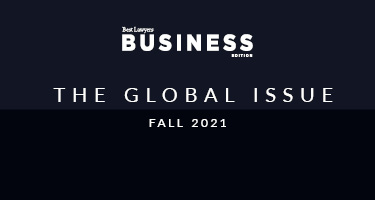The United Nations Environment Programme recently reported that the number of climate-related lawsuits worldwide has more than doubled over the last five years. Canada is contributing to this trend, with the sixth-highest number of climate litigation cases globally. These suits have primarily targeted governments both federally and provincially. However, despite the various claims alleged and the statements in court decisions about the importance of addressing climate change, Canadian courts have consistently demonstrated clear limits on their ability to do so.
Non-Justiciable Cases
“Justiciability” is the legal doctrine that applies when the subject of a case or the relief sought is too political in nature to be properly adjudicated by the courts. Claims that are not justiciable can be struck—a move that recognizes the separation of powers between courts and legislatures.
In Misdzi Yikh v. Canada, for example, two hereditary chiefs of a British Columbia First Nation claimed the federal government had breached the common law and Constitution in failing to legislate to combat climate change. They sought wide-ranging relief, including an order requiring the federal government to amend its environmental assessment statutes to allow it to cancel approval of high-greenhouse-gas (GHG)-emitting projects. The Federal Court struck the claim in 2020 on the basis that it was not justiciable, noting that “[i]t is hard to imagine a more political issue than climate change.”
Similarly, in Environnement Jeunesse c. Procureur Général du Canada, the Quebec Court of Appeal in 2021 held that a proposed class action brought by a youth nonprofit organization against the federal government was non-justiciable. The nonprofit alleged that the government’s failure to implement measures to limit global warming was violating the fundamental rights of young people; it sought an order requiring the government to implement those measures.
While noting that no one questions the urgency of acting to mitigate climate change, the Quebec Court of Appeal nonetheless held that the remedy sought would in effect force Parliament to act without indicating how it should do so, holding as well that deference by the courts was required given that Parliament is better placed to weigh the innumerable challenges of global warming.
Cases in Which Relief Was Denied
Even when finding cases justiciable, courts have sometimes denied the relief sought. The Ontario Superior Court of Justice’s 2023 decision in Mathur v. Ontario dismissed a lawsuit brought by seven Ontario youth. The suit claimed that provincial legislation that lowered emissions targets, and plans for reducing GHG emissions, were not stringent enough to combat climate change, thereby infringing the applicants’ Constitutional Charter rights.
The Federal Court struck the claim in 2020 on the basis that it was not justiciable, noting that '[i]t is hard to imagine a more political issue than climate change.'"
They sought, among other things, an order requiring the Ontario government to “set a science-based GHG reduction target.” The Ontario Superior Court rejected their argument that the provincial government’s legislation adopting a more lenient target for GHG emission reductions was unconstitutional, holding that a “mere change in the law cannot be the basis for a Charter violation.” It characterized the applicants’ claims as alleging the government was not doing enough to protect their Constitutional rights but held that they had not demonstrated that any deprivation was contrary to the principles of fundamental justice.
The court also, however, rejected the Ontario government’s argument that there was no causal connection between its target for reducing GHG emissions and mitigating the effects of climate change. It found that by not taking steps to further reduce the province’s emissions, the government was contributing to an increase in the risk of death, and that while Ontario’s contribution to global warming “may be numerically small, it is real, measurable and not speculative.”
British Columbia’s Supreme Court, in Sierra Club of British Columbia Foundation v. British Columbia (Minister of Environment and Climate Change Strategy), considered provincial legislation that set GHG emissions targets and imposed a statutory obligation on the BC government to prepare an annual “climate accountability” report. The court held in 2023 that the provincial government had complied with the legislation and dismissed the suit—while also noting that if the BC government were required to disclose the information requested, it might have contributed to the province meeting some of its emissions goals “in a break from the consistent history of missing its targets.”
The Federal Court’s 2023 decision in Sierra Club Canada Foundation v. Canada (Environment and Climate Change) rejected a challenge to the federal minister of environment and climate change’s approval of the Bay du Nord oil development project offshore of Newfoundland and Labrador. Two environmental nonprofits and one representing eight Mi’gmaq communities in New Brunswick claimed the minister improperly failed to consider the effects of GHG emissions downstream from Bay du Nord. Downstream emissions are generated by the crude oil recovered from the project and subsequently used by others.
The court held that Canadian regulators have repeatedly found that downstream emissions need not be considered in environmental assessments, and those decisions have been upheld on appeal or review. It also cited authority holding that nothing in the relevant environmental assessment legislation required a consideration of general issues such as climate change in making a decision mandated by the legislation, noting further that the oil from Bay du Nord could be used all over the world for many purposes, which might result in different emissions levels. It would be impossible to determine how much downstream use, if any, would be within Canada. Accordingly, considering the environmental effects of downstream emissions would be speculative, and it was therefore reasonable for the assessment of the Bay du Nord project to exclude them.
Closing Considerations
To date, litigants in Canada have not successfully challenged alleged government action or inaction on matters related to climate change. Nonetheless, many people continue to look for ways to impose responsibility and to require governments to take more robust action to mitigate it.





























